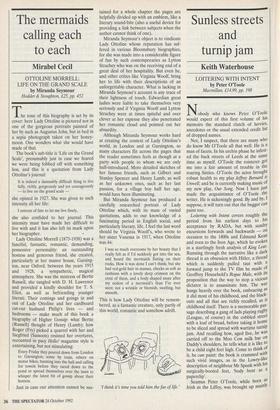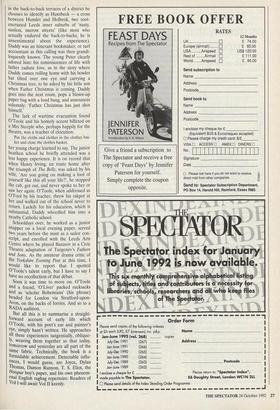Sunless streets and turnip jam
Keith Waterhouse
LOITERING WITH INTENT by Peter O'Toole Macmillan, 174.99, pp. 198 Nobody who knows Peter O'Toole would expect of this first volume of his memoirs the standard clutch of luvvies, anecdotes or the usual extended credit list of dropped names. Not, I suspect, that there are many who do know Mr O'Toole all that well. He is a man of facets. In his urchin phase he infest- ed the back streets of Leeds at the same time as myself. O'Toole the roisterer got me into a fair amount of trouble in the roaring Sixties. O'Toole the actor brought robust health to my play Jeffrey Bernard is Unwell; and he is currently making music of my new play, Our Song. Now I have just made the acquaintance of O'Toole the writer. He is sickeningly good. By and by, I suppose, it will turn out that the bugger c,an paint too. Loitering with Intent covers roughly the period from his earliest days to his acceptance by RADA, but with sundry excursions forwards and backwards — Oil occasion to the 1800s and Edmund Kean and even to the Iron Age, which he evokes in a startlingly fresh analysis of King Lear Running through the narrative like a dark thread is an obsession with Hitler, a thread which is suddenly pulled taut with a forward jump to the TV film he made of Geoffrey Household's Rogue Male, with its proposition that the way to stop a vicious dictator is to assassinate him. The war hangs heavily over the book, embracing as it did most of his childhood, and the black- outs and all that are richly recalled, as is childhood itself. There is a memorable pas- sage describing a gang of lads playing rugby (League, of course) in the cobbled street with a loaf of bread, before taking it home to be sliced and spread with wartime turruP jam. And recalling how, aged five, he was carried off to the Moo Cow milk bar ou Daddy's shoulders, he tells what it is like to be a child eight feet high. Come to think.of it, he can paint: the book is crammed with such vivid images, as in the Lowry-l1k.e description of neighbour Mr Spunk with his surgically-booted feet, 'body bent as a paperclip'. Seamus Peter O'Toole, while born. as Irish as the Liffey, was brought up mainlY in the back-to-back terraces of a district he chooses to identify as Hunsbeck — a cross between Hunslet and Holbeck, two soot- encrusted Leeds inner suburbs of 'nasty, sunless, narrow streets' (like most who actually endured the back-to-backs, he is unsentimental about the experience). Daddy was an itinerant bookmaker, or turf accountant as this calling was then grandi- loquently known. The young Peter clearly adored him: his reminiscences of life with father radiate love, as in the story where Daddy comes rolling home with his bowler hat tilted over one eye and carrying a Christmas tree, to be asked by his little son when Father Christmas is coming. Daddy goes into the next room, pops a blown-up paper bag with a loud bang, and announces solemnly: 'Father Christmas has just shot himself.'
The lark of wartime evacuation found O'Toole and his homely accent billeted on a Mrs Steeple who, perhaps happily for the theatre, was a teacher of elocution: Put the cloths and clothes in the clothes bas- ket and close the clothes basket, her young charge learned to say. The junior heathen school he briefly attended was a less happy experience. It is on record that When Henry Irving, en route home after the triumph of The Bells, was asked by his Wife, 'Are you going on making a fool of yourself like this all your life?', he stopped the cab, got out, and never spoke to her or saw her again. O'Toole, when addressed as O'Fool by his teacher, threw his inkpot at her and walked out of the school never to return. Luckily for his education, which is substantial, Daddy wheedled him into a nearby Catholic school.
Schooldays over, he worked as a junior snapper on a local evening paper, served two years before the mast as a sailor con- script, and enrolled with the Leeds Arts Centre where he played Bazarov in a Civic Theatre adaptation of Turgenev's Fathers and Sons. As the amateur drama critic of the Yorkshire Evening Post at this time, I would like to report that I spotted O'Toole's talent early, but I have to say I have no recollection of that ddbut.
Soon it was time to move on. O'Toole and a friend, `O'Liver' packed rucksacks and as 'scholar Bohemians' (his phrase) headed for London via Stratford-upon- Avon, on the backs of lorries. And so to a RADA audition.
But all this is to summarise a straight- forward account of early life which O'Toole, with his poet's ear and painter's eye, simply hasn't written. He approaches all these experiences tangentially, oblique- ly, weaving them together so that today, tomorrow and yesterday are all part of the same fabric. Technically, the book is a formidable achievement. Detectable influ- ences, I would guess, are Joyce, Dylan Thomas, Damon Runyon, T. S. Eliot, the Hotspur boy's paper, and his own phenom- enal English ragbag repertoire. Readers of Vol I will await Vol II keenly.



































































 Previous page
Previous page